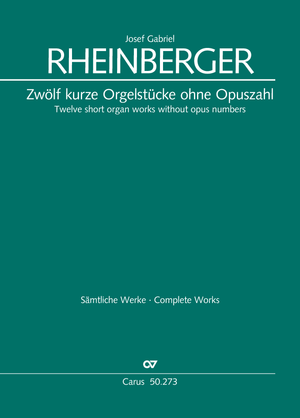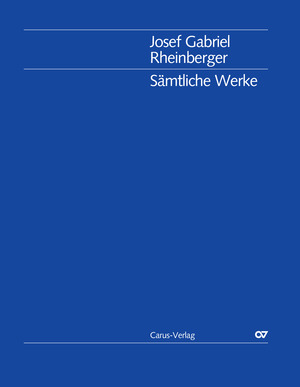Twelve short organ works without opus numbers
As well as 20 organ sonatas and seven collections of stand-alone organ pieces with opus numbers, Rheinberger composed a whole range of smaller works for organ methods or organ collections for his favorite instrument, mainly at the request of colleagues and friends. They are ideally suited for mass and organ lessons.
This organ volume brings together twelve compositions Rheinberger wrote for different occasions and at various points during his career. Included in the collection are seven short pieces in different keys that date from the early 1860s. Rheinberger wrote these at the request of his teacher Herzog and others for several organ collections of “easy, performable” pieces – and they are rewarding pieces for liturgical use. The works without opus numbers (WoO 10, 37, 56, 70) can no longer be regarded as early works. The Fugue in F minor WoO 10 of 1867, with its tendency to translate counterpoint into expressive chordal writing, already displays many characteristics of the late Rheinberger, the Canzonetta WoO 77 is a late work from autumn 1899, whereas the Romanze WoO 70 is a second version of no. 1 of the Miscellaneen op. 174 in the easier to play key of C major.
Separate edition from Supplementary Volume 3 of the Rheinberger Complete Edition
Contents
-
Composer
Josef Gabriel Rheinberger
| 1839-1901During the second half of the 19th century Rheinberger, who was born in 1839 in Vaduz (Liechtenstein), was a major figure of European stature. In demand as a teacher of composition and esteemed as a composer, this professor at the Munich Conservatoire and Bavarian Court Kapellmeister made his mark on a whole generation of musicians. The fact that many of his compositions were no longer performed after his death in 1901, despite their high musical qualities, was largely a result of external circumstances. The change of aesthetic orientation which began about the turn of the century led to a radical move away from the conservative-classical ideals to which Rheinberger – like Brahms – had felt himself committed. It was also a fact that Rheinberger never publicized his own works vigorously. The Josef-Rheinberger-Archiv and Carus published a complete edition of works by Josef Gabriel Rheinberger for the first time. The edition, concluded in 2009, has contributed significantly to the fact that the music of this composition teacher and Bavarian Court Kapellmeister from Munich can once again be heard around the world today. Personal details
-
Editor
Martin Weyer
| 1938-2016
Frequent questions about this work
 There are no questions and answers available so far or you were unable to find an answer to your specific question about this work? Then click here and send your specific questions to our Customer Services!
There are no questions and answers available so far or you were unable to find an answer to your specific question about this work? Then click here and send your specific questions to our Customer Services!










